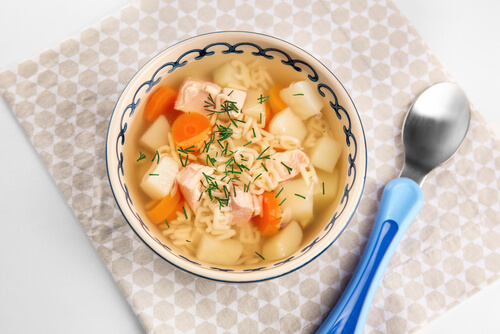A Baby's Seventh Month of Life

In the blink of an eye, your baby is already in his seventh month of life, and now he surely wants a little more independence.
He may have started to sit up on his own and even begun to crawl a bit.
Although not all children develop their skills at the same pace, one thing is certain: a mother’s encouragement is essential when it comes to her baby’s development.
Changes in a baby’s seventh month of life
Weight and size
Generally at this age, children’s weight varies. This is because the foods that a baby eats create different changes in the body.
In the seventh month of life, it’s considered normal for a baby’s weight to oscillate between 7 to 9.5 kg (approximately) and for his height to be between 66 and 72 cm.
Repetition of words and sounds
This is the moment! Help him stimulate his language development. Promote interaction and share language in songs and games.
Pay attention to what you hear. Your baby may already be able to repeat sounds or words, and you won’t want to miss his first pronunciation, even if it’s just syllables.
Attempts and falls
If your baby has already achieved some strength in his legs, he’ll surely want to start crawling. You’ll see him lean on his hands and knees, or even on his feet, in order to get up.
If you still don’t observe this initiative, don’t be discouraged. It may take a while, but it will come!

It’s time to say NO
Even if you don’t believe it, at this stage of development your baby can already recognize a denial. He’ll understand when you say “no” firmly and in a different tone.
He may already have his first teeth and might even bite your nipple or take some unsafe object, so practice saying no!
What should a baby eat in the seventh month of life?
At 6 months you should have started incorporating some foods such as vegetables, fruits and cereals. However, if you haven’t started trying these new foods yet, your pediatrician will encourage you to do so at the next visit.
In the seventh month of a baby’s life, you can add chicken and lean meats in very small and well-cooked pieces.
You can experiment with other types of well-ground grains and incorporate cereals such as wheat or corn. You can also start introducing pieces of sponge cake, soft cookies or bits of bread.

Recommendations
There is no doubt that your baby is developing at high speed. Therefore, it’s necessary to collaborate in their desire to be more autonomous.
With these recommendations, you can promote his motor coordination while also having fun. Apply them and you’ll see how they pay off.
- Provide independence at meal time. Give him the spoon and guide him for a while with your hand.
- Try to get him to make sounds with his palms. You can also have him “throw kisses” or play with a toy that emits a pleasant sound.
- Create healthy sleep habits. You’ll notice that your child adopts a sleep routine.
- This month is a good time to let him start to sleep alone.
- To develop coordination, include games where he can recognize colors and shapes, as well as letters. Try playing games in front of a mirror.
- Adapt some areas of the house for his safety, or create a place where he can play without risk.
The seventh month of the baby’s life is related to small increases in independence.
This means you get to enjoy small moments of relaxation while watching him play, eat and even entertain himself by biting his feet.
If you have any questions about your baby’s diet, your pediatrician’s advice is indispensable regarding foods to add each month.
For example: some pediatricians prefer to wait until babies reach one year of age before introducing fish, while others consider waiting much longer since it’s a potentially allergenic food.
This text is provided for informational purposes only and does not replace consultation with a professional. If in doubt, consult your specialist.








